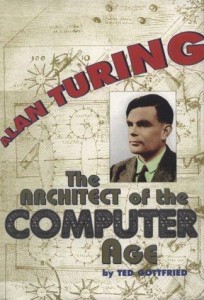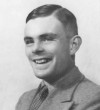
Today is the 100th anniversary of Alan Turing’s birth. I figured that since I’d procrastinated more than 2 years over writing my Turing review, I should do it today to make it look deliberate. Though I only have a little more than an hour left to go in June 23rd. And technically June 23rd is over in the UK. But we’ll ignore that!
Back when I was originally supposed to do this review, I had chosen a book called The Man Who Knew Too Much by David Leavitt. I tried reading this book. Then a long time later, I tried again. Then I just had such a block against even trying that I let it sit around and sit around. Finally about a month ago, I thought I’d look up what my other options are. There are surprisingly few books all about Turing. And no children’s books I could find. I borrowed two through interlibrary loan. One was a hefty textbook-looking thing. I didn’t even crack that one open. The other was Alan Turing: The Architect of the Computer Age by Ted Gottfried and written for a YA audience.
Finally, a book I could get through!
The problem with the Leavitt book was it was too dry and full of footnotes. Of course I’ve read dry things with footnotes before, and it’s fine if the subject is interesting enough, as Alan Turing certainly should’ve been. But it also suffered from a lot of time-jumping that was driving me up the wall. It was pretending to be chronological, but the author kept inserting comments about how this and that and the other thing would happen later. I just wanted a nice story about his childhood and time in school and everything that follows after that.
The YA book gave me that. There are a few spots where there’s a comment inserted. Like, spoiler alert, he’s going to get into running eventually, with Olympic potential. But it happened much less frequently.
I wouldn’t call this book eminently readable; I have read much better, more enjoyable nonfiction. In fact at first it was reminding me of school history books and I was thinking ‘no wonder I found history boring’. But once I got used to the style, it was fine. Plus the subject matter was very interesting.
I had watched, years ago, (even before this review was originally due), the docudrama, “Breaking the Code”, about Alan Turing. It’s great and I highly recommend watching it. In fact I intend to watch it again before the weekend is out.
What I failed to get a sense of from the movie that I got from the book was just how geeky a kid he was. In a time and place where it was not very nice at all to be a geeky boy (there are many times and places like that, of course). It also surprised me to learn just how absent his parents were. It’s not that they dumped him at boarding school, which you sort of expect, but they weren’t even in the country for large portions of his childhood. He’s still a toddler and they’ve both gone back to India. And not even left him with grandparents or aunts and uncles. Even when his father’s job in India is over, the two of them move to France! It’s just so bizarre to me.
The book does a pretty good job of explaining Turing’s accomplishments in mathematics, biology, and of course computer science in a way that’s understandable to me, and probably understandable to most high school students. It also doesn’t shy away from talking about his evolving identity as a gay man and his relationships with other boys and men, and one woman. I didn’t feel like the book was leaving things out to protect the Impressionable Youth ™.
Several times Gottfried referenced the biography by Andrew Hodges. K read and reviewed that book, if you’d like to read her review.
Halfway through the book, I stumbled upon photos. I hadn’t realized there were photo pages in the middle. I never like photo pages being in the middle of the book. I might like to see a picture of Turing as a child, while I’m still reading about his time in school. And then I get to the photos and start looking at them, and then there’s spoilers! It happened with Neil deGrasse Tyson’s book too. So I refrained from looking and went back later, after finishing the book.
The author describes the adult Turing as ‘unhandsome’, but I don’t see that. Maybe it’s the 50’s hairstyle that makes him look like the typical handsome dark-haired man. Or maybe I don’t know what ‘handsome’ means. In a group photo, I can see a little more what the author’s talking about. But I still don’t see him as looking geeky or mad scientist-like. The author a couple of times refers to his appearance or laugh as like a mad scientist.
I paused in the descriptions of a Turing machine to play a second time with today’s Google Doodle. I don’t know if either helped me understand the other more, but it was a nice break from reading.
Turing’s birthday anniversary is only today, but Gay Pride Month lasts until June 30th. So take the opportunity to read or watch more about Alan Turing. He’s an important part of science history and an important part of gay history.
]]>
The Plot
As a child, Alan Turing gave little indication that he was likely to amount to anything. But as a young man at Cambridge, he soon revealed his mathematical abilities and his original way of envisioning problems. During World War 2 he contributed in a highly significant way to the British and American efforts to break the encrypted German military communications. And after World War 2 his vision of computers — and computer programs — proved incredibly prescient.
My Thoughts
Most people who know of Alan Turing at all know of him in relation to two things: first, for anyone who’s studied computer science, are the Turing machine (a theoretical model which Turing first posited and which can be used to describe computer algorithms) and the Turing test, a method for determining whether machines had demonstrated the ability to ‘think’; and second, for his work on breaking the Enigma machine during WWII.
But how many people know he was a world-class distance runner who, but for an injury, might have been able to compete at the Olympics? Or that he actually spent much of his last few years attempting to come up with a mathematical description of how and why organisms attain the structures they do? As with any scientist who has become known for a law or a particular experiment, the less famous details of his life often fall by the wayside.
Author Andrew Hodges does a spectacular job here filling in the blanks of Turing’s life. Not only does he dig up details from the extremely thin written record, but he spent copious amounts of time interviewing the people who knew Turing, gathering little details and anecdotes which really flesh Turing out as a person. It’s this part which I find entirely fascinating, as for the most part the people whose biographies I tend to read are so very long dead that such interviews are completely impossible. And, of course, at this point Turing is very nearly such a person himself — but this isn’t a new book, and at the time Hodges was doing his research, a mere 25 years or so had passed since Turing’s death. So plenty of people were still around to talk about him.
In addition to the life details, Hodges also doesn’t shy away from the mathematics, of which there is quite a bit in this book. Enough that I nearly felt like I was going to have to haul out my old college textbooks just to refresh myself on a few things. In the end I did not, because most people probably wouldn’t; neither did I spend a huge amount of time puzzling over the detailed description of how, precisely, the Enigma machine was broken. It was sufficient that I got the gist of it, and knew that I could go back if I needed specifics.
In all honesty, the central portion — Turing’s time at Bletchley Park doing his Enigma-related work — was the slowest of the book due to the amount of mathematical and mechanical detail included. The inclusion of this material contributes materially to how definitive this biography can be, but I’m not going to lie: it was a hard slog to get through. The pre and post-war sections were much more well balanced and thus considerably easier to read.
Hodges, a gay activist as well as a mathematician, doesn’t shy away from Turing’s tricky personal life any more than he does the tricky math. Turing had the misfortune to be homosexual during a period of panic in the government (both in Britain and the US) over the potential for such people to be compromised or blackmailed by the communists. (That their own laws and intolerances are what made the blackmail possible was an irony appreciated only by some.) He also had the misfortune to be a man who was unwilling or unable to conceal his nature by deceit. In fact, some of Hodges descriptions of his eccentricities probably lead the modern reader to wonder if he was somewhere on the autism spectrum. But whatever the reason, Turing did not hide his homosexuality well, and it became a source of trouble for him.
Hodges presents Turing’s death with all of the facts he could gather; he concludes it probably was a suicide, but the evidence either way seemed pretty thin to me. Still, one must acknowledge the fact that the ambiguity might have been deliberate, to give his mother peace of mind.
In Short
It’s unlikely that another biography of Alan Turing will or could come forward to supersede this one as definitive: Hodges has done his work well, and over the past 30 years has continued to collect supporting material (he speaks of publishing an expanded e-book edition on his website) to supplement the already exhaustive research which went into this volume. Turing’s life, his contributions to cryptography and computer science, are all covered in great detail.
